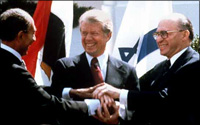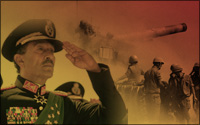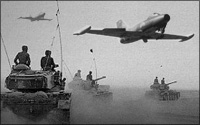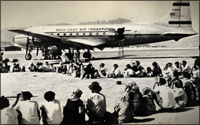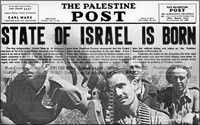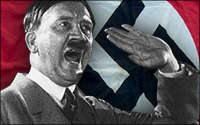 The rise and fall of Adolf Hitler is one of the most terrible, dramatic and unbelievable stories in history. He dealt in death in such boxcar numbers, and so irrevocably altered civilization, that it is impossible for the ordinary human being to fathom how so much evil could exist and be perpetrated essentially by a single person.
The rise and fall of Adolf Hitler is one of the most terrible, dramatic and unbelievable stories in history. He dealt in death in such boxcar numbers, and so irrevocably altered civilization, that it is impossible for the ordinary human being to fathom how so much evil could exist and be perpetrated essentially by a single person.
By all accounts, from his earliest years Hitler was strange and a loner. He wanted to be a painter, even though he was not very good at it. The realization that the world did not agree with his assessment of his artistic talents only served to frustrate him.
His anti-Semitic leanings were evident early on, but it is not clear what his reasons were, if there were any reasons. Life, and certainly anti-Semitism, is not always explicable. At 16, Hitler moved to Vienna. He was a young man alone. During this period, he began to develop his theories of race, which were not original to him but which had existed in Germany the previous century.
In Vienna, Hitler’s Jew-hatred became an obsession – the obsession of his life. Almost his entire war strategy was based upon the Jews. Even as the end of Nazi Germany became obvious, Hitler and other Nazis felt they had accomplished some measure of victory because they had destroyed European Jewry. Eichmann said that he would go to his grave happy in the knowledge that he helped destroy millions of Jews. That was not bravado; it was a viewpoint.
It was also the viewpoint of Hitler, whose last statement of his political last will and testament was that the war against the Jews had to be continued despite his death and Germany’s demise.
Escaping Death Time and Again
Hitler was born in the small town of Linz, Austria. However, he joined the German army in World War I, because to his mind the Austrian-Hungarian Empire was hopelessly decrepit, corrupt and a hollow shell. Germany, on the other hand in his mind, was representative of the Aryan race.
He served as a runner in the German army during the First World War. The life expectancy of runners in the First World War was many times measured in hours or days. It was a job no one wanted. Often it was a method by which commander officers got rid of soldiers they didn’t like rather than formally executing them. Yet, Hitler served and survived as a runner in the German army almost four years!
In October 1918, a month before the war ended, Hitler was wounded in a gas attack. His recovery took two years. In Mein Kampf he pointed out that the wounded soldiers lying next to him on the bed kept dying even though their wounds were far less severe than his. But he survived, eventually regained his health and was discharged from the hospital.
All these brushes with death convinced Hitler that he was chosen by Providence for a special mission. Indeed, throughout his entire life he experienced what can be called miraculous salvations from all sorts of dangerous situations and attempts on his life. Historians record at least 18 known assassination attempts, including those orchestrated by his generals and high ranking officers with direct access to him, some of whom left bombs to explode within inches of him. Yet none of them succeeded. Each time Hitler survived it not only led him to conclude more strongly that Divine Providence had chosen him for a special mission, but to publicly proclaim it.
The Nazi Party
Amid the turmoil after the war, there arose in Germany many nationalist parties called the Folk Parties. Each shared two or three common themes.
First, they said, Germany did not lose the war, but was betrayed into losing the war. Usually, the corollary to that was that the leftists and Jews betrayed them.
Second, the parliamentary democracy set up after the war to run Germany, the Weimar Republic, was hopelessly unwieldy and inefficient.
Third was a call to law and order. German culture abhors chaos and if nothing else post-war Germany was chaotic. Therefore, the Folk Parties appealed to the German peoples’ sense of law and order. Better to have an autocratic regime than allowing the chaos to continue.
Hitler was the 55th member of a Folk Party founded in 1921 called the National Socialist Party, the Nazi Party for short. Ironically, it was not socialist at all. There was a period of time when it seemed that a political party had to have “socialist” in its name if it wanted any popular appeal. The Nationalist Socialist Party was not going anywhere and there was no reason for it to go anywhere. It was only because Hitler galvanized the party, imbuing it with a platform and spirit, that it turned into a political force.
Putsch, Imprisonment and Mein Kampf
In 1923, Hitler tried to overthrow the German government. His party was built upon German veterans who were committed to the Folk Party ideas, including its anti-Semitism. Lending legitimacy to Nazi ideas, Hitler conscripted the backing of one of Germany’s most decorated military heroes, Erich von Ludendorff. However, the attempted coup – known in history as the Beer Hall Putsch — failed miserably and Hitler was arrested.
His prison stay was more like a house arrest and became a media event that, incredibly, earned him the sympathy of the masses. It was during this incarceration that he wrote Mein Kampf, his rambling, anti-Semitic, semi-autobiographical political testament, outlining what Germany had to do to regain its superior, dominant and domineering place on the world stage. In Mein Kampf, Hitler spelled out that he was going to:
- unify Germany with Austria and all German-speaking people in Europe,
- abrogate the treaty of Versailles,
- take back territory that was taken from Germany, including dismantling Czechoslovakia, and taking back the port of Danzig which was given to Poland,
- destroy the virus known as the Jewish people,
- destroy Bolshevism in Russia, and
- expand German borders under the pretense of Lebensraum, “living room” for the German people, which Germany was entitled to by right.
To most people at the time, Mein Kampf was a long-winded tome filled with absolute nonsense. However, most if not all of the “nonsense” became true. In hindsight, it is stunning how the rest of the world – including the democracies in the West and Stalin in the East – misjudged him. Everyone thought it was just the ranting of racist demagogue. Few believed he would ever come to power, and everybody believed that in the remote possibility he ever came to power he would be controllable. Now we know they were dead wrong. Things unfolded exactly the way Hitler said they would unfold.
Fears of Communist Takeover
Hitler was abetted by the tremendous fear of communism taking over Germany.
The communist party in Germany was led by a woman of Jewish birth, Rosa Luxemburg, also known as “Red Rose.” The Jews were prominent in the communist party in Germany, which had a firm control on the labor unions. Strikes in Germany were not countenanced very easily. Yet, at one of the things that sped the end of the First World War was the fact that the German labor force was no longer loyal to the Kaiser. They went on strikes and German war production faltered. It was the fissure that cracked the German war machine.
After the war, and into the 1920s, Germany experienced violent strikes. There was fighting, rioting and deaths. Communism in Germany was abetted by its international stature; it saw Germany as the next country after Russia most likely to turn communist. Trotsky, Lenin and others put effort into mobilizing their forces to expand their revolution into Germany.
Hitler capitalized upon that fear. He found a ready response in the German people, who were more afraid of communism than what he stood for.
Gifted Orator
Hitler was a gifted orator. He would go on for hours at a time and mesmerize his audience. Eye witness accounts talk about his hypnotic stare that could ensnare a person just with a glance. The psychology of domination was an essential ingredient of Hitler’s talent and rise to power.
Hitler also learned to use the radio, which was a revolutionary media in its time. It was a window to the outside world like never before. People did not merely listen but became drawn into the voice emanating from the box. This is true whether the broadcast was a ball game, a dramatic recreation or a leader speaking to his people. Roosevelt’s “fireside chats” moved a generation. People felt their president came into their house to speak to them.
Hitler captured the effect too. When he became leader of Germany his speeches were broadcast all over the world. Even Americans in the United States who did not understand German felt something when a speech of his was broadcast into their home. The intense, animalistic-quality dynamism somehow came through.
Winning the German Street
Hitler was able to mobilize criminal elements into street thugs who literally beat up his enemies. These became a paramilitary organization, the “brown shirts,” named after their uniforms. Hitler took unemployed people off the street, gave them a brown shirt with an armband sporting a swastika, taught them the Nazi salute and handed them a stick to beat others. Suddenly, these powerless people had power.
None of this could have come about without financial backing and Hitler found ready financial support among the German industrialists. They were uneasy with him, but at least he wasn’t a communist calling for the seizure and nationalization of their businesses. They were confident that their financial power would control him – but, in the end, it would be he who would manipulate them to do his bidding.
Despite Nazi gains, it was by no means certain that Hitler would achieve his goals and rule Germany. Although the Nazi party seemed to be gaining in popularity it was not considered a major force even into the late 1920s. Then, fate, so to speak, intervened in 1929 and the world economy collapsed. It began in the United States and spread throughout the industrialized world. When it reached Germany it wreaked havoc. Hundreds of thousands if not millions of people were unemployed and the government was not dealing effectively with the problem.
Germans were looking for a savior and a scapegoat. Hitler provided them with both: he was the savior and the Jews were the scapegoat.
More than anything else, the Great Depression helped boost Hitler. In the election after the Depression first struck the Nazis doubled their seats in the Reichstag, the German Parliament, going from 7% to 13.5% of the vote. And in the ensuing election they reached 21%. At their height they would reach about 40%.
At that point, he felt victory was in his grasp and let loose the brown shirts more than ever before. Pitched battles were fought with his political enemies – not only metaphorically but literally. German politicians engaged in fist fights on the floor of the Reichstag. The Nazis terrorized the opposition. It was open hooliganism.
The Weimar Republic had to make a hard choice between taking strong measures to stop Hitler or face the prospect of civil war. They chose the former. What they found – as the Western powers found later — was that the more they appeased Hitler the more powerless they were to stop him from taking even bolder steps.
The president of the Weimar Republic was the elderly war hero General Paul von Hindenburg. Hitler wanted to be appointed chancellor, which was the second most powerful position to president, and only the president could grant that. Von Hindenburg had resisted the Nazis all along and disparagingly called Hitler the “Bohemian corporal.” Now, however, he felt he had to give in, hoping that being second-in-command would mollify Hitler and he would stop there.
Once Hitler got power, however, no one controlled him. He increased the activities of his brown shirts, even beating to death opposing politicians. Then he presented the Reichstag with the Enabling Act, a bill that would give him absolute powers, in effect making the Reichstag powerless. Although it was political suicide to vote for it, no one dared vote against Hitler and it was passed into law.
When the almost senile President Hindenburg died that summer Hitler had complete control of Germany.
The Third Reich
Hitler was now free to implement policies that he had only spoken about. These policies were based upon three principles.
First, he was going to abrogate the treaty of Versailles. He was convinced he could bluff the entire world and get it done without war. Indeed, almost all of his initial victories were achieved without firing a shot.
The second policy was the destruction of the Jews: first their elimination from Germany and then from Europe. For almost six years Germany encouraged Jewish emigration, persecuting them so severely through government-sanctioned laws and raising the volume of anti-Semitism that most Jews left even when it meant leaving behind their wealth and the land they had lived in and died for for generations.
The third policy was that he was going to achieve full employment and a resilient German economy – and accomplish it through clandestinely putting the Germany economy on wartime footing. By doing so he would unite the labor forces and industrialists and earn the everlasting gratitude of the military.
Hitler declared that his Third Reich would last “a thousand years.” In actuality, it only last 12 years. But in those dozen years more harm would be done to civilization than in all of history until then.

